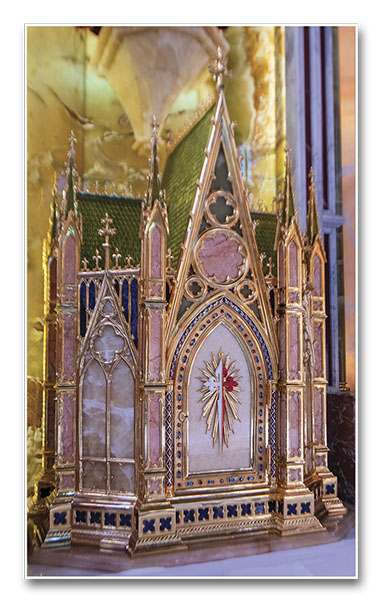Catholic piety has dedicated its most sublime artistic manifestations to Our Lord Jesus Christ in the Eucharist. Magnificent buildings, stained glass windows, music, liturgical splendours of every kind have sprung up over the centuries to render as much glorify and praise as possible in this land of exile to the august and real presence of the King of kings among men in the Sacrament of the Altar.
Now, as a Mother and Teacher of good sense and wisdom, the Church has always been equally concerned with adorning the living shrines of the souls of her children for God.
We are temples of the Blessed Trinity!
Every baptized person becomes a temple of God, according to the promise of the Redeemer: “If a man loves Me, he will keep my word, and my Father will love him, and We will come to him and make our home with him” (Jn 14:23). Therefore, the human soul, which harbours the Trinity itself in a living relationship, is worth much more than all the inanimate ornamentation surrounding altars, or even the tabernacle containing the Sacred Host.

In view of this reality, Catholic doctrine teaches that man’s moral perfection should correspond to, or even surpass, the beauty of the sacred arts; and, consequently, his practical and material life should always be clothed in dignity, out of respect for the Divine Guest of his soul.
The relationship between corporeal and spiritual life
This duty, however, is also based on a more subtle consideration of an ontological nature: since man is composed of body and soul – unified realities, whose separation signifies a violence to our nature – everything that happens in our bodily life has repercussions in our spiritual life, and vice-versa.
A great and prolonged moral suffering, for example, is frequently the cause of ailments of the organism, such as sleep and eating disorders. On the other hand, a routine that is too hectic physically can lead a person to spiritual acedia.
From this it follows that, in the opposite sense, this body-soul relationship, when properly channelled, can have a beneficial impact on the spiritual progress of souls.
Posture and moral behaviour
A very illustrative example for today’s generation concerns the physical posture.
It is increasingly rare to find people who know how to maintain an upright bearing when walking, talking or even sitting. Nowadays, under the pretext of comfort, positions closer to the irrational are adopted… Now, a simple analysis of behaviour shows that, when faced with the hardships of life, people usually react with an irrationality that matches their posture: they shrink back, yield to laziness and even give up completely. Just as they sink into a chair at the slightest sign of fatigue, they collapse in the face of the struggles that come their way.
Is there not, then, a relationship between these two attitudes?
How to attain grandeur of soul
The same also applies in a positive sense. Dr. Plinio Corrêa de Oliveira,1 in a conference given in the 1990s, gives an interesting explanation in this regard, using as a model the historical period of the Ancien Régime.2

He recounts that, at that time, it was required of people of some refinement to walk with their heads high and erect, as a sign of the affirmation of their own dignity. Families would pass on this custom to their adolescent children by tying a small pile of books atop their heads with string. They would then walk about the house and converse with one another bearing with this burden, which obliged them to maintain an upright posture. As a result, they learned to maintain this position when the weight was removed. Hence the noble, dignified and splendid bearing of the figures of that time. They were true monuments of distinction!
Analogously, says Dr. Plinio, for a man to attain grandeur of soul it is necessary that he carries the “pile of books” that Providence “ties” upon his head: the annoyances, the concerns, the sufferings and the setbacks so common to the state of trial.
Obliging oneself to always maintain a good posture is, then, an excellent stimulus to face the hardships of life with nobility. The soul takes on a different attitude! When an obstacle appears, one is more disposed to face it standing on both feet and with the head held high.
Therefore, just as the worldly man shows the laxity of his character in the slackness of his outward demeanour, the Catholic affirms his courage of soul in the nobility of his bearing!
Courage, strength and resolution!
Therefore, dear reader, these lines invite you to be enthusiastic about your sublime status as a temple of God and about your demanding duties as a militant Catholic! Keep always alive within you the certainty that in everything “we are more than conquerors through Him who loved us” (Rom 8:37). If you strive to constantly elevate your way of living, your soul, thus sustained, will become a friend of the Angels and consort with the Blessed in Heaven!
If, however, adversities of the moment weigh heavily upon you and weakness overcomes you, have recourse without hesitation to the transforming affection of Our Lady, Virgin most clement, and trust that She will soon give you strength, as if telling you: “My child, let us forge ahead! As a Mother, I understand the difficulty you have in bearing these setbacks, which are your personal burden. But consider well the dignity of suffering all these things for love of Our Lord Jesus Christ and the Holy Church. Lift up your head and give thanks to God! I myself will be your support!” ◊
Taken from the Heralds of the Gospel magazine, #170.
Notes
1 CORRÊA DE OLIVEIRA, Plinio. Conference. São Paulo, June 6, 1990.
2 From the French: Old Regime. The expression was originally used by Girondin and Jacobin agitators to pejoratively designate the system of monarchical government of the Valois and Bourbon families, preceding the French Revolution of 1789. This epoch was characterized by the splendour of the ceremonial in court life and by the harmonious and hierarchical order reigning in society.

